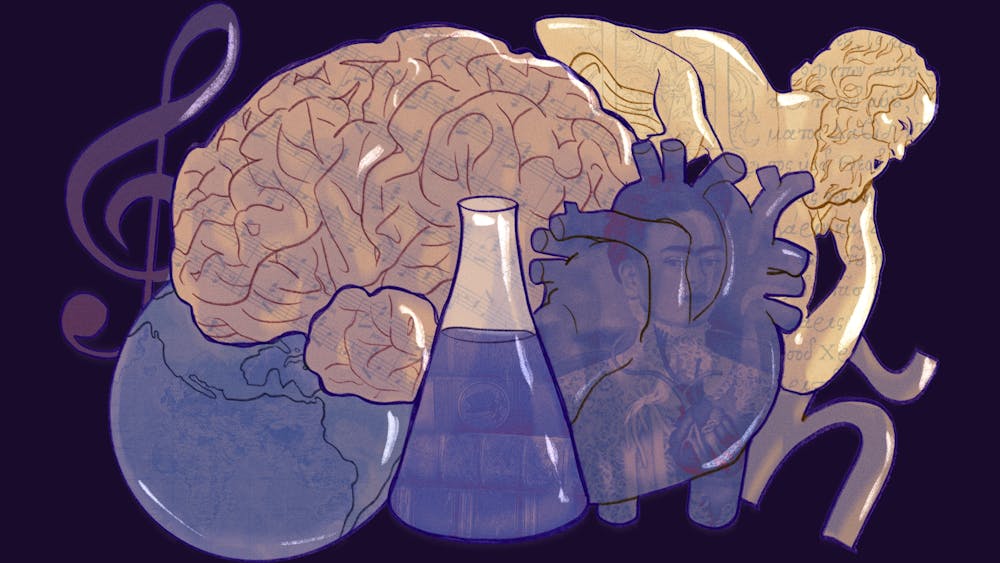
As I sat in my general chemistry lecture waiting for the professor to start, I overheard a very peculiar conversation.
One student said, “I don’t know why med school forces us to take a year of humanities. It feels like it’s detracting my attention from my chemistry and Math 1400 courses. If I revised it, I would remove the humanities curriculum — that way, it’s easier for us to just finish off the requirements.”
Another student replied, “Yeah, I agree. I don’t remember any student having to do a literary analysis to diagnose a patient; if I’m being honest, English is a waste of time in my schedule.”
I passively rolled my eyes at their woes.
While STEM courses at Penn can be demanding, it feels a bit hasty to dismiss any inclusion of the humanities within medicine. I can’t help but think that these types of conversations are what influence other students to stereotype pre-med students as a generally disliked part of campus culture, both at Penn and other universities.
But does the trope of the social climbing, prestige-focused pre-med student actually hold true? The (unsurprising) truth is it’s complicated.
Some people may argue that the medical world’s lack of concern for the humanities causes the unempathetic and overly pragmatic nature of these aspiring physicians. On some level, their perception of pre-med students’ unwillingness to embrace the humanities within the medical curriculum is true, with a sampled majority of pre-med and medical students rejecting the notion of a humanities requirement in the curriculum.
The pre-med students who are more open to the idea of a humanities imbued education may still refrain from taking such supplemental courses due to worrying that it will distract from their STEM classes or tank their GPA. While pre-med students can’t all be chalked up to unrelenting pre-professionals, it is clear that this hesitation to take humanities classes shapes others’ perceptions of the “heartless pre-med” stereotype.
As a pre-med English major, I often feel that I am stuck between these two spheres. Between the worlds of Penn’s pre-professionalism and the empathy centered English academia, it’s hard to reconcile these identities in a way that is seen as complementary — not just to myself, but to others. My peers and family around me often wonder why I major in English when “Biology would be the easier track.” If that isn’t their point of scrutiny, they’ll often object: “What do you plan to do with an English degree if you drop pre-med? You know English majors aren’t very employable.”
Pre-med students’ lack of willingness to engage with the humanities, combined with people’s unsolicited opinions about my academic choices, led me to feel uncertain about whether I was making the right decision for my future. However, after researching extensively, I argue that humanities provides an indispensable and undervalued outlet for the medical field and its inhabitants.
For one thing, practicing the humanities gives you the soft skills necessary to succeed in medical school and beyond. The practice of medicine is inherently social, and as such, students must adapt to the clinical uncertainty that naturally follows. Especially in a specialty that deals with the unprecedented themes of death, loss, and accumulated suffering, students and physicians alike must find themselves being able to navigate these social stressors and simultaneously empathize with their patient’s struggle.
Humanities, even in small amounts of exposure, intensively reworks the student’s brain to be able to understand the underlying framework of a person while still maintaining mental composure. Its effect is two-fold: the subject reinforces the medicinal pillar of empathy while also giving students the opportunity to effectively manage the secondary trauma that they may face in this emotionally attuned field.
Extensive background in the humanities can have quantitative effects too. Those who major in humanities see a statistically significant increase in their MCAT score and medical school admission rate in comparison to their STEM peers, with humanities majors being the top major accepted to these selective institutions. Due to humanities majors’ eagerness to expand their horizons beyond the basic sciences, they often are more prepared to meet the Association of American Medical College's "Core Competencies," or the requirements needed to be a successful medical school applicant and healthcare provider.
Those who aren’t humanities majors, though, can still see significant boosts when they participate in humanities courses; these students will often find themselves more prepared for the Critical Analysis and Reasoning Skills (CARS) section of the MCAT when refining their reading and writing skills in classes.
By taking on an unconventional major in their path to medical school, pre-med humanities majors are actively reaping benefits to their personal and professional wellbeing. Their decision to improve upon themselves is not only beneficial to their career but also to the larger reform of the healthcare system. Therefore, we should cheer in celebration for students — humanities and STEM both — who decide to push themselves the extra mile to gain indelible skills to become empathetic and well-rounded doctors. In doing so, we can denounce the traits of selfishness, sterility, and hostility that have held a chokehold over the pre-med archetype and instead foster a community of pre-med students that value patient care, compassion, and leadership for decades to come.
MAX BRODY is a College sophomore studying English and health and societies from Oklahoma City, Okla. His email is benbrody@sas.upenn.edu.
The Daily Pennsylvanian is an independent, student-run newspaper. Please consider making a donation to support the coverage that shapes the University. Your generosity ensures a future of strong journalism at Penn.
Donate



